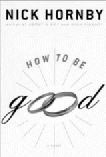HOW TO BE GOOD
by Nick Hornby (Riverhead Books, $23.95) Elliott Bay Book Co., 101 S. Main, 624-6600 7:30 p.m. Mon., July 16
IT’S A TRICKY phase for Nick Hornby, pop-culture novelist. Should he rehash the type of alternative rock lyric-quoting, doomed romantic character that powered his first two works of fiction to fervent acclaim and lucrative movie deals? Or should he try to push his youthful dalliances out of the way and assume his role as Important Writer?
That really is a tough spot for an author, all smugness aside, and Hornby’s acerbic record store clerks (High Fidelity) and know-it-all guys (About a Boy) take the predicament up a notch. How can an ambitious novelist whose characters so expertly skewer any and all sellouts avoid selling out himself? (Keep in mind that he’s already done the cheeky memoir, Fever Pitch, and edited the short-story anthology, Speaking with the Angel.) Hmmm.
As an answer, Hornby races off in an unexpected direction, creating Katie Carr, the general practitioner wife of David, a curmudgeonly stay-at-home husband, and a mother of two. She’s reached her boiling point, has had an extramarital fling, and then asked David for a divorce—over the phone. And she has a time- consuming, respectable job and children. Real-life stuff.
Is this a ploy from a writer whose third novel needs to show maturity? It seems that way at first, but the awkward setup, more the domain of Philip Roth, is about to lead to a Tom Robbins turn.
Hornby’s wild card character is DJ GoodNews, an ex-raver and reformed ecstasy freak who developed a mysterious ability to heal the angst-ridden, cure aches and pains (even eczema), and pinpoint psychological quandaries with the (hot) touch of his hands. GoodNews now hopes to push beyond these attributes to tackle more serious business: How to make your ordinary middle-class English bloke into a good person.
David, too immature to face the familial strife associated with Katie’s request for divorce and subsequent admission of an affair, is poised to become GoodNews’ first convert and second-in-command. He abruptly abandons his one outlet, writing an embittered column for a North London community newspaper, and lets go of his anger. Despite Katie’s objections—she’s a doctor, after all, and a middle-aged woman looking to either stabilize or abandon the household she’s worked hard for—David invites GoodNews to live with the Carrs.
David and GoodNews’ first project: to convince neighborhood families to loan their spare bedrooms to homeless teens. The Samaritans host a party that starts like a convivial getting-to-know-the-neighbors affair but is a disguised launch for the duo’s plan. “I’m 41 years old,” says David from his perch atop a chair, toward the end of his pivotal sermon. “And I have spent half my life regretting that I missed the Sixties. I read about the energy, and I imagine what the music would have sounded like when you hadn’t heard it a thousand times before, and when it actually meant something, and I’ve always been sad that the world is different now. I got a bit excited about Live Aid, but then you realize that these problems . . . They’re too big now. They’re never going to go away.”
UH-OH. KATIE was hoping to get David to work on their personal problems, but he’s now set his sights on a complex, microscopic variation of working for world peace—and challenging liberal sensibilities head on. “I’m a liberal’s worst nightmare,” he announces to Katie just before the crusade.
Her dilemma is a metaphor for how Hornby’s fans will feel about How to Be Good. Sure, he’s clever enough to work in his usual assortment of timely and/or nostalgic pop references; on their way to a dinner party, she recalls a list of 100 or so figures that David and the host have lambasted at past gatherings, from John Lennon to David Mamet to Pel頴o Bart Simpson. As ever, he writes for the silent majority, depicting the agnostic and ambivalent as close to three-dimensionally as you can get on the printed page. (You can almost see David in his pajamas, routinely preparing his son and daughter’s lunch before settling at his desk to surf the Web and procrastinate writing his column.) These characters, like many of us, harbor strange obsessions, and Hornby’s primary talent is bringing them to the fore in all their twisted, realistic, and somehow lovable hideousness.
Unfortunately, David’s not the narrator of this book, and while Katie’s obsession with him allows us to see every flaw in David and the complicated human beneath his skin, it also prevents us from getting to know her and GoodNews and the kids, Tom and Molly. Likewise, Hornby’s grown-up messages about divorce and marriage, which briefly edge toward poignancy, become lost in a stew of post- New Age claptrap and liberal-baiting philosophy. It’s not as clever a concept for a third novel as you’d hope, and the execution is disappointing for an author who had raised expectations to lofty heights.






